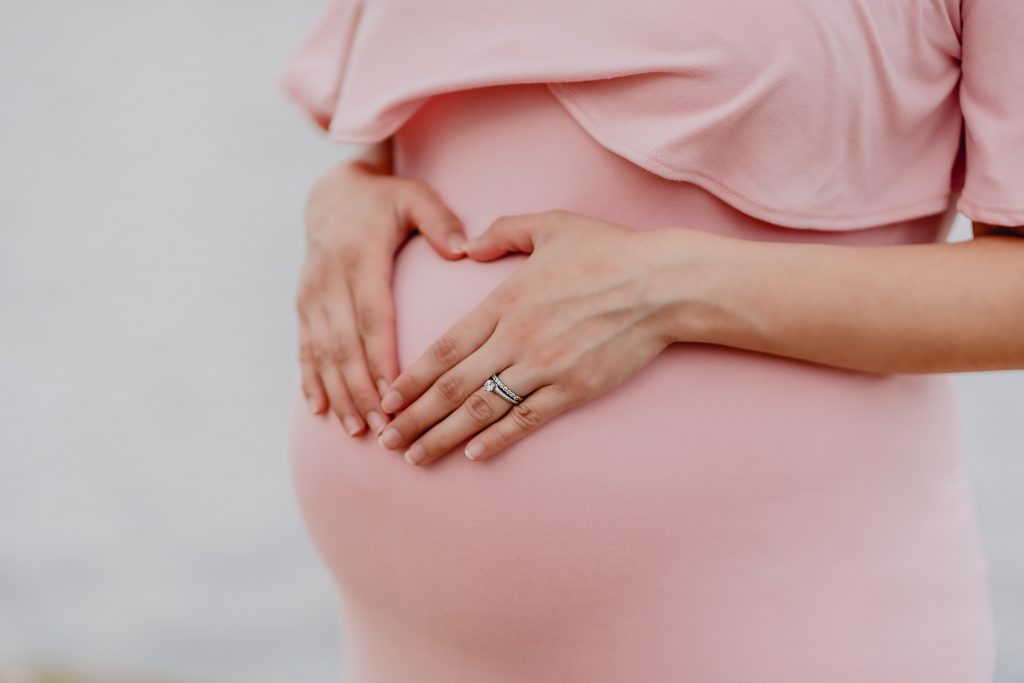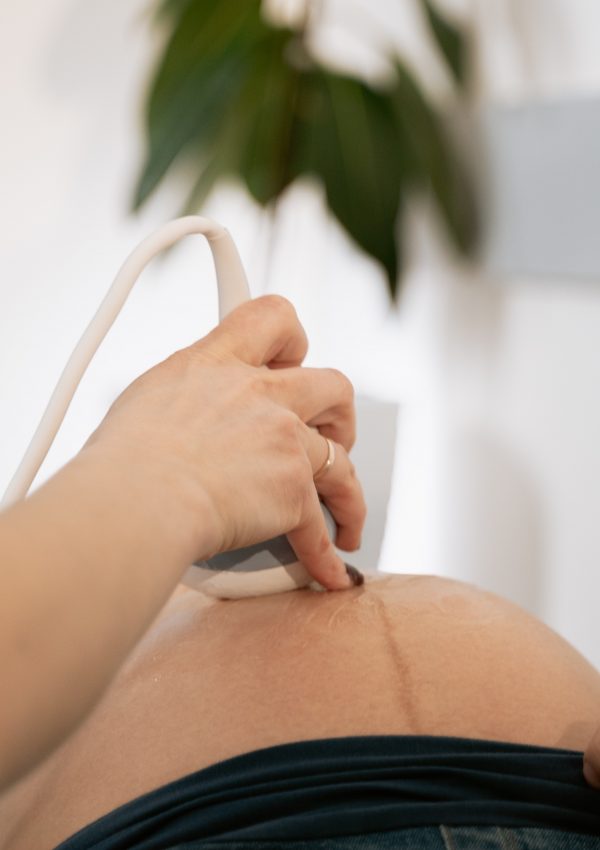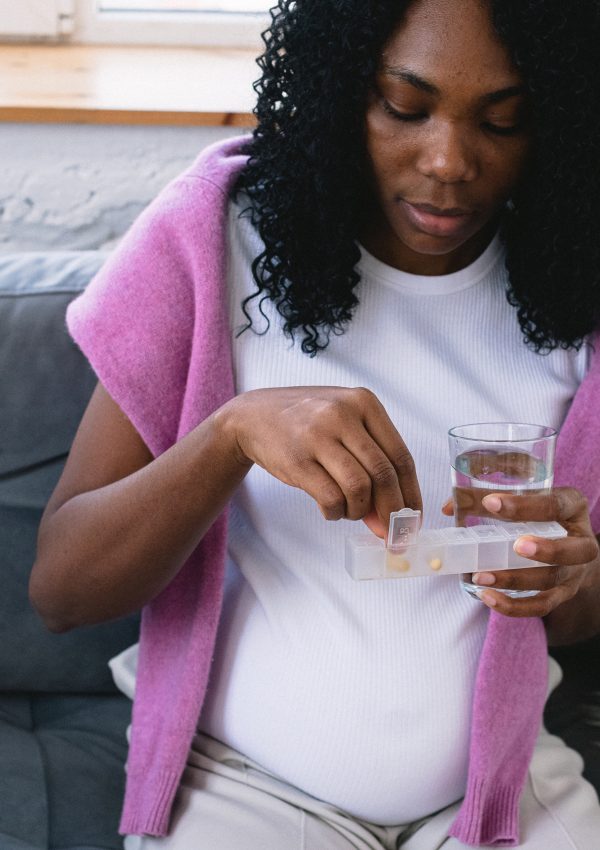Think you may be pregnant? Here are 19 early pregnancy symptoms to look out for before you even need to take a test!
This post may contain affiliate links, which means I’ll receive a commission if you purchase through my links, at no extra cost to you. Please read full disclaimer for more information.
If you’re here you probably have a feeling that you could be pregnant. You may also be a little curious as to what you can expect whenever you do become pregnant. Either way, there are so many different ways our bodies tell us whether we’re pregnant, before it’s even time to take a test.
Depending on how in tune with your body you are, you can notice that something is ‘just different’ well within your first month of pregnancy. Knowing which symptoms to spot can give you a better indication as to whether a test will come back positive.

This post is all about 19 early pregnancy symptoms to look for before taking a test.
When do symptoms start?
To understand when symptoms usually start, you have to understand the pregnancy timeline.
Pregnancy is 40 weeks long starting from the first day of your last period. This means that by the time you miss your next period, you would be 4 weeks pregnant, for example.
Now, around halfway through your cycle ovulation typically occurs. And if there are sperm waiting to meet your egg when you ovulate, you could conceive. Conception doesn’t mean you’re pregnant that alone won’t result in pregnancy symptoms.
You’re only pregnant once the fertilized egg implants in your uterus.
When the egg implants, it’ll trigger your body to start producing a number of different hormones, which in turn triggers pregnancy symptoms.
An embryo can implant in your uterus as soon as 6 days after ovulation, and that’s the earliest you can start to feel pregnancy symptoms. Most women, however, will start to feel symptoms at the 4-6 week mark, or 2-4 weeks after ovulation.
When to take a pregnancy test
There are a number of great pregnancy tests that can give you results many days sooner than your missed period but it’s best to wait until after your period is late to take a test.
Doing so will not only take a away from the stress of squinting at a line that’s not there, but it will give you a higher chance of getting a big fat positive.
19 Early Pregnancy Symptoms
There are so many ways to tell if you could be pregnant well within the first month of pregnancy. Some symptoms may be constant and some may come and go so try not to harp on every little thing. Pay attention to them as a whole and if your period is late, take a test!
1. Increased basal body temperature
If you’ve been temping throughout your cycle, a sign of pregnancy is an elevated basal body temperature (BBT). Not just for one day, but for consecutive days following ovulation.
Your BBT drops on the day you ovulate and spikes the day after, but only by a little bit (we’re talking tenths of a degree). Your temperature then stays elevated before dropping a day or two before your period is due. If you’re pregnant, your BBT might stay elevated throughout your pregnancy.
To accurately track your BBT, you’ll need either a BBT thermometer or a monitor like this one.
If you’re using a thermometer, you’ll have to take your temperature when you’re fully at rest. This is usually first thing in the morning, before you get out of bed. And you have to take it at the same exact time every day.
Tracking your BBT is only useful when you’re looking at the trend over the course of your cycles for at least a month. If you only started a week ago, it’s not going to tell you much even if you are pregnant!
2. Morning sickness
Morning sickness is one of the main tell-tale signs of pregnancy and can kick in as early as 4 weeks.
It can also occur with or without vomiting and is a symptom that a majority of pregnant women experience. Morning sickness happens because your hormones are changing rapidly and it takes your body some time to get used to it.
In addition, it may be called morning sickness, but it can strike at any time. It’s just common in the mornings because that’s when you’ve typically gone the longest without food. It’s a old wives tale that your morning sickness is worse if you’re pregnant with a girl *winky face*. Just something fun to keep in mind!
3. Food cravings and aversions
It seems like changing hormones are the main reason for most pregnancy symptoms and that’s because it’s true! Foods that you used to love, will suddenly repulse you, and vice versa. When I was pregnant, the only meal I could stomach were garden salads for my entire first trimester.
Your crazy cravings and aversions can start as early as 4 weeks but should subside by the second trimester. During this time, it may be tough to eat 3 well-rounded meals a day. So in order to make sure you’re getting the right amount nutrients for both yourself and your baby, you’ll want to make sure you’re taking a prenatal vitamin.
RELATED POST: The Best Prenatal Vitamins for Soon-To-Be Moms
4. More cervical fluid
Another sign that you could be pregnant is increased amounts of cervical fluid. Cervical fluid has different phases in any given cycle but when you’re pregnant, your body typically secretes more for many reasons.
Part of it could be due to hormonal changes or maybe your body is finding a way to protect the embryo that just implanted. Whatever the case, it’ll probably have a cloudy or milky consistency that’s not too thick but not quite watery either.
5. Cramping

Cramping is one of the more ambiguous symptoms because it’s also a PMS symptom. Annoying right?
Having been pregnant, I can say that the cramps feel like Aunt Flo is on her way, but never shows up. There are debates on whether you can actually feel implantation but it’s highly unlikely since the embryo is microscopic at this point.
If you don’t usually experience cramping before your period arrives, but you start feeling them all of a sudden, it could be a sign of pregnancy.
6. Stretching sensations in your belly
As soon as you become pregnant, your body will waste no time preparing your body to grow your baby.
Especially if you’ve never been pregnant before, you may feel stretching and pulling sensations in your belly. This is just your body’s way of making room for your little one. As long as the stretching and pulling isn’t accompanied with blood, you likely have nothing to worry about.
These sensations shouldn’t be painful either. If it’s anything more that a slight tugging a few times a day, it’d be a good idea to reach out to your doctor.
7. Bloating
Experiencing bloating is definitely a PMS symptom, however, it could be a sign that you’re pregnant. As your uterus expands to prepare for your baby, you may look and feel bloated for a while.
As your hormones are reaching levels they probably haven’t before (or since the last time you were pregnant), you may also retain more fluids. Bloating is a completely normal symptom of early pregnancy.
8. Back pain
As your uterus expands and places pressure in your pelvic region, you may feel low back pain. This specific type of back pain is also known as sciatica, which is a nerve in your spine. Your growing uterus can place pressure on that nerve and cause inflammation resulting in pain, sometimes a lot of pain.
It happened to me and I had to see a specialized chiropractor who helped relieve the pain. Physical therapists are also great professionals to see for sciatica too.
It may be a sharp or dull pain but you’ll know it if you experience it. It’s best to get it treated ASAP because your uterus is only going to get bigger during your pregnancy, which will leave you susceptible to more pain.
9. Implantation bleeding
A pregnancy symptom that’s not so common is something called implantation bleeding. You may have seen countless posts about how to differentiate between implantation bleeding and your period and there are four main symptoms you’ll want to look for:
- Occurs during possible implantation days (between 6 and 14 days past ovulation)
- Lasts a full day max
- Light flow and will not fully soak a pad or tampon
- Pink or brown blood NOT bright red
Implantation bleeding only happens to 10-15% of women. If you experience some light bleeding and it goes away after a few hours, then it could be implantation bleeding instead of your period.
10. Breast changes
Many women who know they’re pregnant usually say that sore breasts were one of their first symptoms. Not only that, but they may also mention that they’ve noticed their areolas get bigger and darker.
You can thank estrogen, progesterone, and prolactin for this! Your breasts get bigger in order to hold more milk and your areolas get bigger and darker so they’re easier for baby to spot for nursing. You might even notice you’ve gone up a full cup-size by 6 weeks!
You may also get breast soreness as a PMS-symptom too. But the dead giveaway would be that the soreness will increase instead of tapering off.
11. Headaches

Another early pregnancy symptom would be headaches. This one can be tricky because headaches are also a symptom of PMS.
If you’re experiencing headaches and you’re not late for your period yet, it could just be PMS. However if you’re late and you’re experiencing headaches, it could be a sign of hormone changes resulting from pregnancy.
12. Trouble sleeping or vivid dreams
Some women report having insomnia or very vivid dreams as an early pregnancy symptom. Becoming pregnant can cause you to experience many different emotions. Your body’s way of sorting through these feelings of happiness, anxiety, etc., may be through vivid dreams.
You could also have some trouble sleeping due to the changing hormones and different sensations going on in your pelvic area. When I became pregnant, I had trouble sleeping very early on but thankfully it tapered off before the end of the first trimester.
13. Fatigue
A very common early pregnancy symptom is feeling fatigued. The moment you become pregnant, your body uses an incredible amount of energy to generate the necessary amount of nutrients for your baby to grow. Your heart may also pump up to 50% more blood throughout your body!
These are just a few of the huge changes your body will undergo right from the start of pregnancy so it’s no wonder you’ll be somewhat tired. Fatigue, in combination with your changing sleep habits can make you feel like you’re fighting for your life, so getting enough rest is critical.
In your second trimester, the fatigue may disappear, which is incredible. But it comes back full force in the third trimester, especially if you’re carrying multiples.
14. Dizziness
If you feel like the room is spinning and it’s been at least 6 days since you’ve confirmed ovulation, you could be pregnant. Pregnancy causes your blood pressure to drop because your blood vessels expand. So it’s common to need to lay down for a bit.
Whenever you feel dizzy, try resting if you can and drinking some cold water. If it doesn’t subside and it’s accompanied with intense cramping or bleeding, you’ll want to reach out to your doctor ASAP.
15. Closed cervix positioning
Your cervix position changes multiple times throughout your cycle and even multiple times throughout the day. Checking your cervix position isn’t going to be very useful unless you check it at the same time everyday for at least a full cycle.
Typically, your cervix will feel high, soft and open around ovulation to let sperm in. If you’re pregnant or have already ovulated, it may be high or low but it will typically be closed. And right before your period comes, it’ll be low and open.
If you’re having a hard time finding your cervix it’ll usually feel like the tip of your nose if it’s closed, and feel like your lips if it’s open. Cervix positioning varies from person to person so just because it happens to be low and open, doesn’t mean you can’t be pregnant.
It’s just one symptom to take into consideration amongst others.
16. Frequent urination
Although frequent urination is said to also be a PMS symptom, it’s an early pregnancy symptom too. Changing hormones after ovulation can cause you to go to the bathroom more but so can pregnancy and here’s why:
- You uterus expands placing pressure on your bladder
- Period-like cramps make you feel like you have to go
- More blood circulation
- Pelvic pressure due to uterus expanding
I wouldn’t think too much of frequent urination when you’re in the two-week wait (up to 14 days after ovulation). However, if it persists past that point, you could be pregnant.
17. Cold-like symptoms

One of the weirder early pregnancy symptoms is feeling like you’re coming down with a cold. Common symptoms include:
- Cough
- Stuffy nose
- Itchy throat
This happens because your defense mechanisms are lowered so that your body doesn’t reject the embryo when it tries to implant. A couple days after a successful implantation, the symptoms should subside.
The cold-like symptoms usually only last a day or two so if they continue longer than that, you may unfortunately be coming down with a real cold!
18. Metallic taste in your mouth
Feeling like you just ate nickels is one of the most bizarre pregnancy symptoms ever. Again, due to changing hormones you can feel a metallic taste in your mouth for a few days and even have bleeding gums due to the higher volume of blood in your body.
19. Missed period
Last but not least is one of the most common early pregnancy symptoms: a missed period. The best way to know for a fact if your period is actually late, is by tracking your cycles. If you’re tracking your cycles using a cycle tracking app, you should have an idea of how long your cycles typically are.
To go a step further, you could track ovulation if you’re actively trying to get pregnant. Why? Because if you ovulate later than usual in one cycle, you may think your period is late when it actually isn’t. Knowing your body is key to understanding pregnancy symptoms better.
Conclusion
Pregnancy symptoms vary from person to person. You could have many of these symptoms but not be pregnant or you could have none and be pregnant. The only way way to know for sure is to take a home pregnancy test after you’re missed your period. That’ll give you the best chance for a positive result!
This post was all about early pregnancy symptoms to spot before you even have to take a test.




